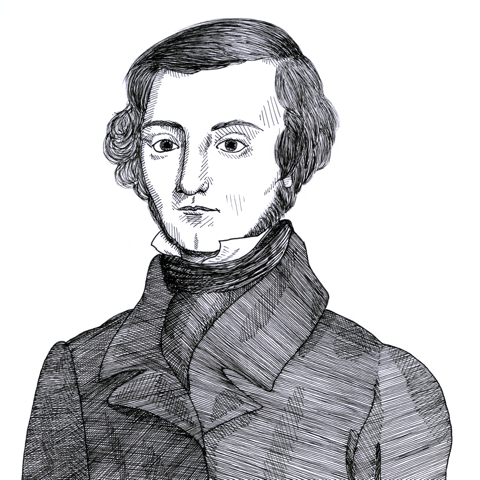Liberty Matters
Tocqueville Himself on American Equality

It is fitting, I think, to give the last word to Tocqueville. Since we discussed several meanings of equality, here is an insightful (and lesser-known) long passage from his voyage notes in which he compares equality in America and France (all quotes are from Alexis de Tocqueville, Journey to America, ed. J.P. Mayer, trans. George Lawrence, Yale University Press, 1962, pp. 258-60)[90]
He begins by highlighting the advantage of America as follows:
The relationship between the different social positions in America is rather difficult to understand, and foreigners make one or the other of these two mistakes: either they suppose that in the United States there is no distinction between man and man except that of personal merit, or else, struck by the high standing accorded to wealth here, they come to think that in several of our European monarchies, in France for instance, we enjoy a more real and more complete equality than that of the American republics. I hold, as I said above, that both of these ways of seeing the matter are exaggerated.First, let us get the ground clear: equality before the law is not at the moment in question, for that is complete in America; it is not only a right, but a fact. One might even say that for whatever inequality exists elsewhere, the world of politics makes ample compensation in favour of the middle and lower classes, who, with the inheritors of historical names, hold almost all the elected offices.I am talking of equality in the exchanges of social life: the equality which draws certain individuals to come together in the same places, to share their views and their pleasures, and to join their families in marriage. It is in that that one must make distinctions between France and America. The differences turn out to be essential.In France, whatever one says, prejudices of birth still hold very great sway. Birth still puts an almost insurmountable barrier between men. In France, the profession a man exercises still to a certain extent places him socially. These prejudices are the most fatal of all to equality, because they make permanent and almost indelible distinctions, even when wealth and time are against them. Such prejudices do not exist at all in America. Birth is a distinction, but it does not in the least place a man socially; it carries with it no right and no disability, no obligation towards the world or towards oneself; class structure by professions is also almost unknown; it certainly does make a definite difference to the position of individuals, a difference of wealth rather than of standing, but it does not create any radical inequality, for it by no means prevents the intermarriage of families (that is the great touchstone).
After pointing out the advantage of America over France, Tocqueville goes on to explain what makes America different:
This is the difference for the worse: The first of all social distinctions in America is money. Money makes a real privileged class in society, which keeps itself apart and rudely makes the rest conscious of its preeminence. This preeminence of wealth in society has less fatal consequences for equality than those which spring from prejudices of birth and profession. It is not at all permanent; it is within the reach of all. It is not radical, but it is perhaps even more offensive still; it is paraded in America much more impudently than with us.
And here is Tocqueville's conclusion:
To summarize then, men in America, as with us, are ranked according to certain categories by the give and take of social life; common habits, education, and especially wealth establish these classifications; but these rules are neither absolute, nor inflexible, nor permanent. They establish passing distinctions and by no means form classes properly so called; they give no superiority, even in thought, to one man over another. So that although two men may never see each other in the same drawing-rooms, if they meet outside, they meet without pride on one side or envy on the other. At bottom, they feel themselves to be, and they are, equal.
Who can say all this better and more elegantly than our beloved Tocqueville?
Endnotes
[90.] Alexis de Tocqueville, Journey to America, ed. J.P. Mayer, trans. George Lawrence, Yale University Press, 1962, pp. 258-60.
Copyright and Fair Use Statement
“Liberty Matters” is the copyright of Liberty Fund, Inc. This material is put on line to further the educational goals of Liberty Fund, Inc. These essays and responses may be quoted and otherwise used under “fair use” provisions for educational and academic purposes. To reprint these essays in course booklets requires the prior permission of Liberty Fund, Inc. Please contact oll@libertyfund.org if you have any questions.